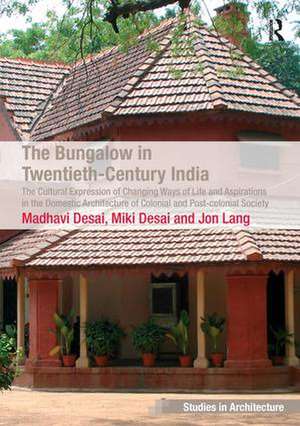The Bungalow in Twentieth-Century India: The Cultural Expression of Changing Ways of Life and Aspirations in the Domestic Architecture of Colonial and Post-colonial Society: Ashgate Studies in Architecture
Autor Madhavi Desai, Miki Desaien Limba Engleză Hardback – 16 ian 2012
Din seria Ashgate Studies in Architecture
- 8%
 Preț: 390.34 lei
Preț: 390.34 lei - 28%
 Preț: 821.14 lei
Preț: 821.14 lei - 24%
 Preț: 329.91 lei
Preț: 329.91 lei - 30%
 Preț: 768.30 lei
Preț: 768.30 lei - 11%
 Preț: 362.88 lei
Preț: 362.88 lei - 14%
 Preț: 325.34 lei
Preț: 325.34 lei - 24%
 Preț: 321.88 lei
Preț: 321.88 lei - 25%
 Preț: 826.84 lei
Preț: 826.84 lei - 30%
 Preț: 776.81 lei
Preț: 776.81 lei -
 Preț: 449.41 lei
Preț: 449.41 lei - 30%
 Preț: 770.74 lei
Preț: 770.74 lei - 28%
 Preț: 823.99 lei
Preț: 823.99 lei - 22%
 Preț: 324.16 lei
Preț: 324.16 lei - 25%
 Preț: 881.28 lei
Preț: 881.28 lei - 14%
 Preț: 338.33 lei
Preț: 338.33 lei -
 Preț: 469.34 lei
Preț: 469.34 lei - 28%
 Preț: 878.01 lei
Preț: 878.01 lei - 12%
 Preț: 328.00 lei
Preț: 328.00 lei - 31%
 Preț: 767.47 lei
Preț: 767.47 lei - 18%
 Preț: 1012.89 lei
Preț: 1012.89 lei -
 Preț: 469.34 lei
Preț: 469.34 lei - 28%
 Preț: 826.84 lei
Preț: 826.84 lei - 26%
 Preț: 850.54 lei
Preț: 850.54 lei - 25%
 Preț: 710.66 lei
Preț: 710.66 lei - 13%
 Preț: 338.33 lei
Preț: 338.33 lei - 31%
 Preț: 767.67 lei
Preț: 767.67 lei - 16%
 Preț: 338.33 lei
Preț: 338.33 lei - 14%
 Preț: 340.33 lei
Preț: 340.33 lei - 26%
 Preț: 821.82 lei
Preț: 821.82 lei - 26%
 Preț: 821.53 lei
Preț: 821.53 lei - 28%
 Preț: 827.64 lei
Preț: 827.64 lei - 30%
 Preț: 768.69 lei
Preț: 768.69 lei - 28%
 Preț: 822.11 lei
Preț: 822.11 lei - 25%
 Preț: 799.76 lei
Preț: 799.76 lei - 28%
 Preț: 826.01 lei
Preț: 826.01 lei - 30%
 Preț: 769.51 lei
Preț: 769.51 lei
Preț: 823.08 lei
Preț vechi: 1142.34 lei
-28% Nou
Puncte Express: 1235
Preț estimativ în valută:
157.49€ • 165.03$ • 130.20£
157.49€ • 165.03$ • 130.20£
Carte tipărită la comandă
Livrare economică 12-26 aprilie
Preluare comenzi: 021 569.72.76
Specificații
ISBN-13: 9781409427384
ISBN-10: 1409427382
Pagini: 256
Dimensiuni: 174 x 246 x 22 mm
Greutate: 0.63 kg
Ediția:1
Editura: Taylor & Francis
Colecția Routledge
Seria Ashgate Studies in Architecture
Locul publicării:Oxford, United Kingdom
ISBN-10: 1409427382
Pagini: 256
Dimensiuni: 174 x 246 x 22 mm
Greutate: 0.63 kg
Ediția:1
Editura: Taylor & Francis
Colecția Routledge
Seria Ashgate Studies in Architecture
Locul publicării:Oxford, United Kingdom
Cuprins
Contents: Preface; Introduction: the bungalow: its origins and its evolution in 20th century India; Part I The Family House: A point of departure: residential building types in India in 1900 - indigenous and colonial; The utility of the bungalow as a precedent for 20th century residential architecture. Part II The Evolution of the Bungalow and its Offspring in the 20th Century: Suburbanization, cultural change and building type modifications; Architects, architectural fashions and stylistic shifts; Regional climates and cultures and house form: diversifying and homogenizing factors. Part III Postscripts: Apartments and bungalows, villas and 'farm' houses; Conclusion: the disappearing bungalow?; Bibliography; Index.
Notă biografică
Jon Lang, Emeritus Professor at the University of New South Wales, Australia and Director for urban design at ERG/Environmental Research Group, Inc., Philadelphia Pennsylvania,USA
Recenzii
'Though a great deal of lucid writing exists on monumental Indian architecture, few architects today have given scholastic space to domestic buildings. The book is both an amalgamation of the many forms of the Indian house, as well as a distillation of that strange hybrid called the bungalow. Rigorous research expected of the impeccable credentials of the authors, places the once dormant subject squarely on the literary table. A scholarly work, immensely readable.' Gautam Bhatia, Architect, India 'This rich documentation and interpretation of the Bungalow in India propels our understanding of its contemporary and mutated manifestations and establishes its deep influence on our thinking about cities in South Asia - the book is a great handbook for practitioners in India.' Rahul Mehrotra, Harvard University, USA
Descriere
Focusing on the twentieth century, this book correlates the evolution of the bungalow in India from a one storey building with a verandah to a variety of villa-types with the development of modern Indian history. In doing so, it not only explains the various technological, political and social developments that shaped the bungalow, but it examines more generally what it meant to be modern in Indian society as the twentieth century evolved.


